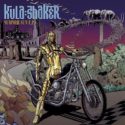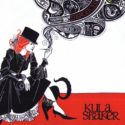Kula Shaker
| Track | Album / EP / Single |
|---|---|
| 303 | K |
| Govinda | K |
| Tattva | K |
| Great Hosannah | Peasants, Pigs & Astronauts |
| Song Of Love/Narayana | Strangefolk |
| Figure It Out | Pilgrims Progress |
| Ophelia | Pilgrims Progress |
| Troubled Mind | Summer Sun EP |
| Drink Tea | free download |
| Infinite Sun | K 2.0 |

Kula Shaker (l to r): Alonza Bevan (bass), Crispian Mills (guitar, vocals), Paul Winterhart (drums), Jay Darlington (keyboards)
Contributor: James Tanner
I started writing this on Friday 16th September 2016 which, by chance, just happened to be the 20th anniversary of the release of Kula Shaker’s debut album K. In the two decades since this event the band went from the top of their game to social pariahs, and then quietly returned and played out the last 12 years to their dedicated fan base without much interest from the musical press (or what’s left of it).
Kula Shaker were formed by a group of friends at college in Richmond in south west London with the seeds planted in the late 1980s but the name and the recognised line up finally settled in 1995. In the preceding years Crispian Mills had visited India and nurtured a love of the country’s music and mysticism. This new love would form the backbone of Kula Shaker’s style and their unique place in the British musical landscape of the 1990s and Britpop.
The band has had five members since 1995 and has always been a four piece. The most famous and outspoken member is Crispian Mills, son of the child actress Hayley Mills and the grandson of cinema legend Sir John Mills. As well as being the face of the band Crispian is a very good guitarist and is the lead singer. Bass is played by Welshman Alonza Bevan, big tea fan and owner of a studio in Belgium where the most recent albums have been recorded. On drums is Paul Winterhart, the quieter member of the band who has worked with various side projects during the Kula Shaker slow years. Harry Broadbent is the keyboard player and the most recent member to join, having done so in 2006; his father is a renowned organist and Harry also does a lot of session work. The original keyboard player was Jay Darlington who left the band after the second album; he went on to be the touring keyboard player for Oasis and was affectionately known the ‘The Shroud’ or Jesus by the band and fans due to his long hair and beard giving him the look of the famous chap from Bethlehem. Darlington now plays in a psychedelic band called Magic Bus who pop up with gigs around Glastonbury (the village, not the festival in nearby Pilton).
The debut album K was released in 1996; a huge success which saw Kula Shaker go straight to the number one album spot in the UK. They had already been a support act on one of the days at the legendary Oasis gigs at Knebworth a month before. Preceded by the singles, Tattva (twice), Grateful When You’re Dead and Hey Dude, the band had tied their colours to the mast as being a psychedelic act in the indie guitar based Britpop scene of the mid-nineties. Their second album, Peasants, Pigs & Astronauts, failed to have the same success as the debut and only got to number 9 and then after ten weeks dropping out of the top 75.
Now, you can’t discuss Kula Shaker without addressing the elephant in the room; the dreaded Swastika comments made by Crispian. The NME wrote an article where he was quoted as saying he liked the swastika symbol and this was twisted and manipulated by The Independent newspaper, making him look like a right wing sympathiser or worse. Crispian came out and stated that he was talking about the historic use of the swastika (which has been a peace symbol for thousands of years but sadly defiled forever by the Nazi Party), but the damage to the band’s reputation was done and their sales were negatively impacted. Sadly, Kula Shaker split up in 1999 and went off separately to pursue their own musical projects. From this point, Jay Darlington didn’t rejoin the band.
In 2004, Kula Shaker came together to contribute to a charity record and this spurred them into action to reform the band and write some new material. Harry Broadbent joined on keyboards and the ball was rolling again. In 2007, their third album Strangefolk was released and they toured and played festivals worldwide to promote it.
In 2010, there was a fourth album, Pilgrims Progress, which was very well received by the music press and again they toured worldwide until Crispian decided to put the band on a hiatus again so he could direct Simon Pegg in the movie, A Fantastic Fear Of Everything (not very well received).
2016 saw the release of the album K 2.0 which saw Kula Shaker’s sound go back to its psychedelic style as it had started out. Extensive touring has followed with the band returning to the USA, much to the delight of their American fans.
I’ve been to see them live four times spanning the years 1997 to 2016 (they even supported themselves in 2008 under the name of Dr Joel and the Companeros playing covers of their own material disguised as a travelling band of Italian hippies!) and each time they’ve blown me away with the quality of musicianship and energy of the performances. I highly recommend anyone who likes them to get to a gig.
303. A song about a road? But not just any road for this is the A303 that connects Basingstoke in Hampshire and Honiton in Devon, but most importantly it’s the road that goes past Stonehenge. Kula Shaker took the A303 and made it the British musical equivalent of the USA’s famous Route 66. When I was a schoolboy in Hertfordshire we had to catch the 304 bus (Borehamwood to Hitchin) to school and back and to this day myself and my fellow Britpop knowledgeable commuters sing “You can find your way home on the 304”.
We all sing along to Govinda, none of us know what we’re saying and hearing this song makes me crave a curry. It got to number 7 in the UK chart and must be one of the most successful sitar and Sanskrit language based songs in the history of popular music. They also released an alternative, rockier and faster version as a B-side under the name Govinda ’97, Hari & St George.
Another Indian music inspired track and the band’s first single, it was released in 1995 and only reached 96 in the charts before being re-released again in 1996 and reaching number 4. Tattva really blew my mind when I first heard it and turned me on to the Kula Shaker sound. At a time when most Britpop bands were making music with an obvious nod to the Rolling Stones, Small Faces, Beatles and the punk movement, Kula Shaker were ploughing a furrow that owed much to the sound of Deep Purple and the Grateful Dead, but done in that classic British way. The chorus can be translated to “Truth, mystery, difference, oneness, Truth” … watever that might mean?!
Over six minutes long, this epic song was the opening track from their second album. Great Hosannah is classic Kula Shaker with religious/mystic themed lyrics, guitar riffs, organs, great drumming and Crispian’s powerful vocals. Later on, the album is a more gentle, almost jazzy reprise, with the track Last Farewell.
Narayan was a track on The Prodigy’s huge album The Fat Of The Land and had been co-written by Crispian Mills, with his vocals too. Crispian took his original idea and reworked it back into a Kula Shaker song, Song of Love/Narayana. The song repeats the Sanskrit mantra “Om Namah Narayan” which can be translated to mean praying to the lord that nothing is mine. You are the supreme controller. We can add that to the Sanskrit that Kula Shaker have taught us!
More classic Kula Shaker lyrical content in this rocker, Figure It Out, from Pilgrims Progress with Crispian asking the big question that has fascinated humanity for its entire history: “are we alone here facing the world, trying to figure it out”. The song opens with the Sanskrit “sri Krishna sankirtanam” which is a reference to the most recent incarnation of the God Krishna so we can assume the lyrics of the song are asking if a God is with us.
Ophelia is a character in Hamlet who is said to have drowned after falling into a river from a willow tree. The lyrics and gentle guitar picking music are the reasons I’ve chosen this song:
Oh my child, how I need you
Precious heart, young Ophelia
Willow veil’d, silken sail’d
Floating through my dreams
You were tired of this shadow life
Of fears that holds us tight
I will lie beside the river now
Forever and a night
Oh, and it proves that Crispian isn’t just educated in the ways of Sanskrit and ancient Hindu religion, he’s got some Shakespeare too! And yes it does sound a bit like The Day I Met Marie by Cliff Richard!
I’m a sucker for a song that starts off slowly and comes in with a big chorus and Troubled Mind certainly does that. It’s a B-side and in the same way Noel Gallagher gave away too many great songs Kula Shaker definitely could’ve made this an album track.
Drink Tea (For The Love Of God!) is a bit of a novelty track and was a free download during the mid 2000s (but they made a video for it and even sold T shirts and other merchandise based on the drinking tea ethos on the tour around the same time). Written by Alonza Bevan it pays homage to tea, and whilst the lyrics are fun the riffs are of a very high quality. I’m talking Twinings not Typhoo here!
This track brings us bang up to date. Infinite Sun is the opener on the band’s 2016 album K 2.0. This song was originally jammed and played during the K sessions back in the band’s early days but for some reason got shelved until rediscovered for the new album. And boy was it worth the wait! It’s got all the Kula Shaker ingredients in the mix and played live on their recent tours has gone down a storm.

Kula Shaker (l to r): Alonza Bevan (bass), Harry Broadbent (keyboards), Paul Winterhart (drums), Crispian Mills (guitar, vocals))
Everything about Kula Shaker and related
Strange Folk: Kula Shaker fanzine
Kula Shaker biography (Apple Music)
James Tanner’s teenage years were played out with Britpop exploding all around him. He watched Oasis debuting Supersonic on Channel 4’s “The Word” and this was his musical epiphany. The years 1994–1997 were filled with gigs (the first one was Menswe@r at Shepherd’s Bush Empire), drunken sing-alongs and arguments over which Oasis B-side was the best ever song! His Britpop highlight was listening to the vinyl of Super Furry Animals’ The Man Don’t Give A F*** on his parents’ record player and enjoying the look on his mother’s face while she did her ironing being bombarded by the F word! He now brainwashes his two children with Blur albums before bed in the hope a new generation of Britpop fans will be secured. Follow James on Twitter @Britpopmemories
TopperPost #575









Follow